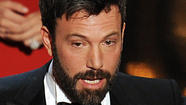"Argo," which became the first movie to win best picture without its director being nominated since 1989's "Driving Miss Daisy," collected two other Academy Awards, for editing and adapted screenplay. But it was not the evening's most recognized film: That honor went to Ang Lee's "Life of Pi,"which won four Oscars — for directing, visual effects, cinematography and score.
"Thank you, movie god," said Lee, whose movie came into the evening with 11 nominations, one behind Steven Spielberg's"Lincoln." The film about the 16th president helped Daniel Day-Lewis make movie history, as he became the only man to ever win three lead actor statuettes. "Lincoln" won one other prize, for production design.
The song-and-dance heavy ceremony, hosted by Seth MacFarlane, hewed closely to a traditional awards show script, but there were several surprises. First Lady Michelle Obama, who joined the ABC telecast from the White House, announced "Argo" as the best picture. And the ceremony featured only the sixth tie in Oscar history and the first since 1994, with the sound editing award split between "Zero Dark Thirty" and "Skyfall." For the first time in Oscar history, six best picture nominees were $100-million blockbusters.
The ceremony was billed as a tribute to music in film, and boasted a number of extravagant musical numbers — including a medley of songs from movie musicals and an appearance by Barbra Streisand, who sang "The Way We Were." The telecast also paid homage to the long runningJames Bond series, with Adele singing the theme from "Skyfall" and Dame Shirley Bassey performing the theme from 1964's "Goldfinger."
Jennifer Lawrence, 22, nabbed the lead actress prize for her role as an emotionally unstable widow in "Silver Linings Playbook" — and promptly tripped over her long dress walking up the stairs to accept her statuette. The crowd quickly gave her a standing ovation. "You guys are just standing up because you feel bad that I fell and that's embarrassing," Lawrence said to the applauding crowd at the Dolby Theatre.

The evening's very first award — for supporting actor — was a shocker, with long shot Christoph Waltz winning for his role as bounty hunter Dr. King Schultz in Quentin Tarantino's"Django Unchained" over favored contenders Robert De Niro("Silver Linings Playbook") and Tommy Lee Jones("Lincoln"). Waltz, who won the same award three years ago for Tarantino's "Inglourious Basterds," dedicated his prize to his writer-director, who also won the Oscar for original screenplay. "We participated in a hero's journey — the hero being Quentin," Waltz said.
Tarantino pulled off a mild surprise with the screenplay triumph for his slave-revenge tale. He dedicated his award to his eclectic cast of actors. "I actually think if people know my movies 30-50 years from now it's because of the characters I create," Tarantino said.
Anne Hathaway's supporting actress win for her emotionally raw portrayal of a doomed seamstress in "Les Misérables" was hardly as startling. The 30-year-old had been the odds-on favorite to win since the film first screened for members of the Motion Picture Academy in late November. "It came true," she stage-whispered as she picked up her trophy for her performance, the centerpiece of which is the lament "I Dreamed a Dream."
Some of the evening's wins were bittersweet.
The animated feature Oscar was shared by "Brave" directors Mark Andrews and Brenda Chapman, an unusual pairing given that Chapman was fired from the Pixar Animation Studios film and replaced by Andrews in the middle of production. "Making these are a struggle — it's a battle, it's a war," Andrews said backstage. "I was very happy it was him who took my place," Chapman said.
Rhythm & Hues Studios, the company behind "Life of Pi's" visual effects win, recently filed for bankruptcy and laid off hundreds of its employees. As Oscar winner Bill Westenhofer addressed the situation in his acceptance speech, he ran over time and the theme from "Jaws" began to play him off the stage. His microphone was cut off just as he said the words "I urge you all…"
William Goldenberg was a double nominee in the film editing category — he worked on both "Argo" and "Zero Dark Thirty" — and won the prize for Affleck's CIA drama.
"Working at my father's deli, I had to do a million things at one time," Goldenberg said backstage about the best training for his job. "It really does prepare you for the multitasking it takes to be in an editing room."
.gif)




.jpg)


